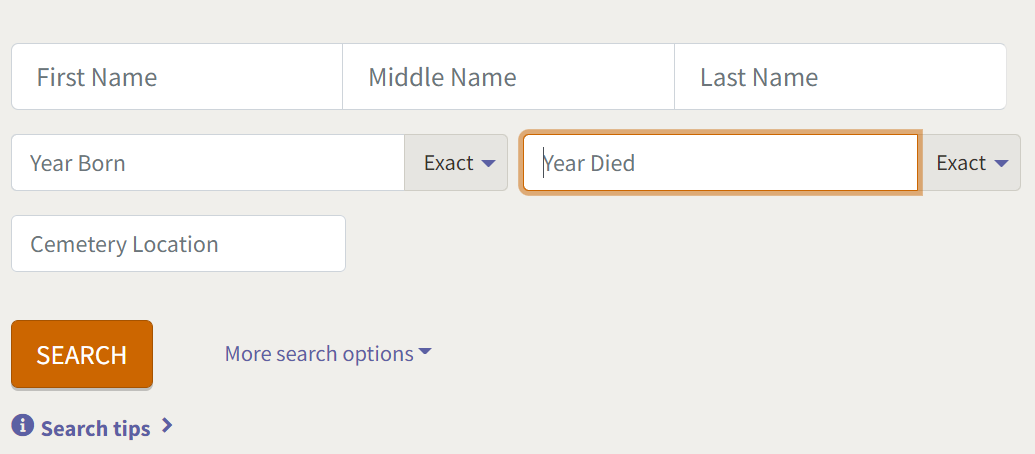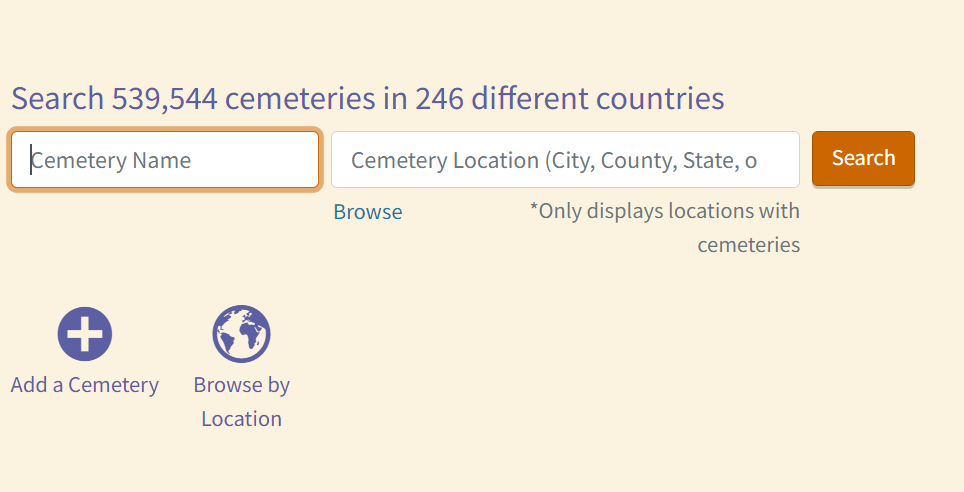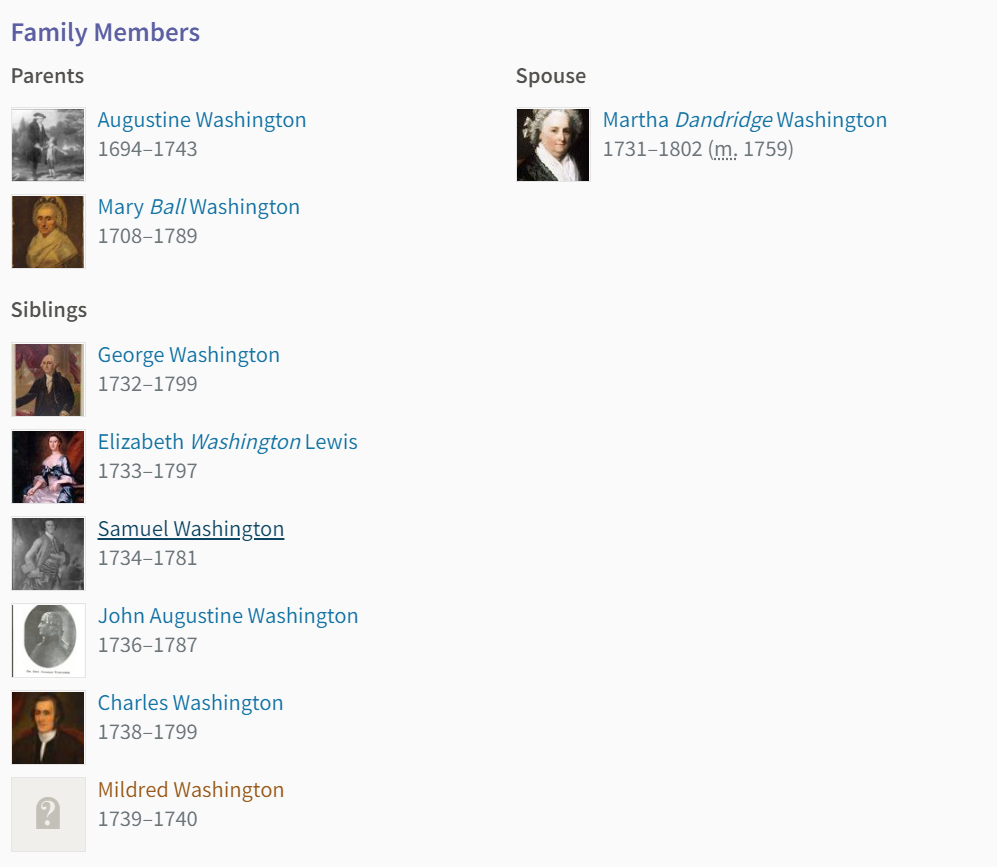Find A Grave Review 2024
When you're embarking on genealogy research, you'll likely stumble upon a distant relative who died in a faraway country. Visiting a grave to pay respects can be a humbling way to pay homage to our ancestors and enrich our research, but if they're buried in a foreign country, this can be tricky.
Find a Grave is a genealogy resource and database designed to solve that issue and bring your lost, deceased ancestors to you with a database of over 75 million grave photos, as well as over 170 million cemetery records.
Today we're going to take a look at the resources this database offers and how it can help you with your genealogy research.
Who Is Find A Grave?
As genealogy resources go, Find a Grave is one of the oldest and has been active since 1995. Created by Jim Tipton, it was originally designed purely as a fringe interest site for records of deceased celebrities and where they were buried.
It shortly became a commercial business and was trademarked as it expanded to include the graves of non-celebs and expanded to people who were buried outside of the USA. After running the site for 18 years, Tipton sold it to genealogy giant Ancestry in 2013 and became one of its subsidiaries.
In 2018 Ancestry began overhauling the Find a Grave old site as well as developing an app for it for Apple and Android.
What Is Find A Grave?
Find a Grave describes itself as the largest online "graving community" with a database of cemeteries, obituaries, burial data, and other final disposition data. Its mission is to help people worldwide collaborate to discover and record information as part of a "virtual cemetery experience," with "information on cemeteries and deceased ancestors worldwide.
What Information Does Find A Grave Provide?
Find a Grave gathers together useful physical information regarding cemeteries, such as directions, maps, and photos of tombstones.
Every person who's added has an individual memorial page that includes photos of the person and their tombstone, obituary information, and links to other family members' memorials. They sometimes have the exact location of the grave within their cemetery.
It can be a great resource if you're looking for obituary information, as the community often updates the archives with obituary transcriptions or newspaper clippings.
Find A Grave Resources
The main menu search at the top left-hand corner has several search options you can select from depending on what information you're trying to learn.
Memorials
This section is for locating a particular gravestone of someone you're curious about. Clicking the "Memorial" tab will take you to this page.

Here you can put in however much information you have; obviously, the more you have, the better to locate the exact spot of a gravestone. If you have limited information and only know their name, then it's simply a case of scrolling through the returned options to find the person of that name you're looking for.
You can narrow down the search parameters by clicking on the 'More search options' button, which lets you search by a number of restrictions such as:
- Memorial type
- Nickname/Maiden name
- Similar name spellings
- Sibling/parent/spouse name
- Birth and death dates
Options like nicknames can be very useful if you're hunting for someone who identified with their nickname more than their given name and was buried under that name. The ability to search for people by the name of their relative or spouse can also give an insight into the people who were important to whoever you're searching for.
There's also an option to leave "virtual flowers" at a grave as a way of paying your respects.
Cemetery
Let's say you're starting out with no burial information on the person you're trying to discover, as many genealogists do; in this case, you can begin by searching for a cemetery in a geographical location if you have an inkling of where they might be buried.

You can search by cemetery name or by location if your knowledge of the person you're searching for is very limited.
There's also a map view option linked to google maps that shows the exact number and location of cemeteries in a given area around the world, which can be useful if you're performing local research or research that doesn't relate to just one individual. Find a Grave currently contains cemetery information on 539,544 cemeteries in more than 246 countries, so the odds are you'll be able to find the information that you're looking for.
If you have a Find a Grave account, you can also add to your "Favorite Cemeteries" and "Virtual Cemeteries" sections where you can compile the memorials that you follow.
Celebrity Graves
The "Famous" link takes you to a search engine that searches for the information of deceased celebrities. You can search by location, claim to fame and find new listings.
It includes the listings of an endless range of celebs, ranging from contemporary movie stars and musicians to past US presidents and famous historical figures like Shakespeare.
Each profile contains photos of the tombstone, as well as transcriptions of their epitaphs and details of their burial site. There's also a list of their relatives who, if they're on Find a Grave, will have a link to their own profile. Here's what the relative page for George Washington looks like.

As you can see, this resource can be fantastic not only for people who are performing their own genealogy research but people who are interested in the lives of famous deceased individuals. By giving us additional information on the histories of people who were close to who we're searching for, Find a Grave gives us a fuller understanding of their life.
What If I'm Not Researching Genealogy?
Find a Grave was initially set up as a site for those curious about celebrities' burial places. While it's been purchased by genealogy company Ancestry, it still offers plenty for people who are simply interested in the deceased and graveyards in general.
Under the explore option, you'll find a series of categories accommodating a general interest in the topic.
Born/Died on this date
This simple feature is interesting to check simply to see which famous people died or were born on that day. The search will return a full list of every profile on Find a Graveyard with a breakdown of their burial information as well as a biography.
Yearly Necrology
A necrology is a list of people who died during a particular period. This section allows you to search deaths via their year of death. You can also narrow the search parameters using the drop-down categories, which include the full gamut of professions and accolades, including Medal of Honor recipients, artists, and architects, organized crime figures, composers, religious figures, and royalty.
Posthumous reunions
This section gives a series of historical events and allows you to view all those who were involved in them together in one spot.
You can select from miscellaneous dates, film and television casts and crew, sports teams, and musical groups to see where the deceased who were involved are buried.
Interesting epitaphs and monuments
If you're passionate about the art of tombstones or are like a witty or meaningful epitaph, you can find them under this section, where you can view them here. This can be an entertaining way to see some extravagant or beautiful tombstones or cenotaphs or maybe have a chuckle at some ironic tombstone philosophies.
Is Find A Grave Reliable?
As Find a Grave is operated and compiled by its users, who are a broad demographic of hobbyists and professional genealogists, you can expect to find discrepancies in the information, and not everything you find will be from a reliable source.
While there's lots of information on the site gleaned from obituaries and lived experiences with the deceased official records, some of it may be second-hand and unverified. As there's no moderating team, this unverified information can often go unnoticed until someone with a genuine link notices it.
It's important to cross-check any data you find on Find a Grave to be sure it's legitimate.
How Can I Contribute To Find A Grave?
To contribute to Find a Grave, you'll need to register your name and details to become a member then; there's a range of ways you'll be able to contribute, including:
- Add new memorials
- Upload photos to existing memorials
- Suggest edits/updates to existing memorials, such as updating incorrect birth and death dates
- Transcribe epitaphs and photos
- Fulfill photo requests. If a relative cannot view the tombstone of a cemetery near you, you can add photographs of it to their memorial.
Controversy
A Google search will reveal that, for the most part, consumers are upset about the service that Find a Grave delivers.
Family members are unable to consent to images of their relative's graves and information being put on their records which can be very distressing, especially in the case of infant deaths. Furthermore, as it's an entirely community-driven project with little-to-no official moderation, it's difficult to appeal to have unwanted memorials removed, and most complaints resolve in the complainer having no success when they try to have them removed.
The thought of having a stranger upload online images of the tombstone of a loved one for anyone to see is understandably upsetting, and part of the blame can be laid directly at Find A Grave's feet, which give higher honors to people who contribute to their database.
Find a Grave was first established as an opportunity for hobbyists to learn about the burial of famous celebrities, and this element still exists in its community. Despite the fact that it has tried to become a genealogy tool, there's the question of whether it would be best if it was still reserved for celebrities.
Fans of Find a Grave may argue that the site exists to provide information to future generations. However, the human aspect of upsetting living relatives is still a relevant issue and one that should make us consider the morality of such a resource.
Forum Space
Find a Grave is a community project, so a forum space is an integral part of the experience.
There are individual message boards to discuss particular topics with a Q&A section to help solve any problems you might be having or walls you've hit in your research. You can also use this section to access the support center or report bugs affecting your experience.
There's a section for corrections and statistics, as well as one for social discussions, which includes a grief and emotional support section, as well a space dedicated to military discussion.
Many users report unfriendly interactions with forum members. However, this is an unfortunate aspect of any online forum; tensions can already be high regarding this platform's often sensitive subject matter.
How Does Find A Grave Compare To The Competition?
Find a Grave vs. BillionGraves
BillionGraves is Find a Grave's biggest competitor, offering essentially the same service but aimed specifically at genealogy studies.
Founded in 2010 with the express purpose of being a genealogy tool, their mission is to provide accurate cemetery data verified by GPS technology, meaning they adhere to the strict Genealogical Proof Standards to verify their profiles, which are as follows:
- a reasonably exhaustive research
- complete and accurate source citations
- analysis and correlation of the collected information
- resolution of any conflicting evidence
- a soundly reasoned, coherently written conclusion
This immediately sets them apart as a more effective and legitimate tool than Find a Grave which, as we've discussed, is prone to collecting and failing to amend incorrect data. You won't find a profile on BillionGraves without a photo and GPS grave markers of the tombstone.
If you're interested in past celebrities and people of importance, their relatives, and their burial site, Find a Grave is the right choice, but BillionGraves is a more legitimate and effective genealogy tool for researching cemetery records.
Find a Grave vs. Ancestry
While Ancestry isn't exactly the same as a site specializing in the deceased, their massive database of profiles included in their global family tree includes millions of deceased ancestors.
Ancestry's databanks include data posthumous data such as death and burial records dating back as far as 1538 that you can search for by restricting your search parameters. This database is regularly updated by members of the Ancestry team, as well as users.
Ancestry's legitimacy is one of the leading consumer DNA testing platforms and is held to high standards, while by comparison, Find a Grave is a much smaller platform that isn't as rigorously vetted, which leads to it containing a lot of incorrect data. You won't find this on Ancestry, and if you do, it's much easier to have it removed.
Find A Grave: Frequently Asked Questions
Is Find a Grave free?
Membership to Find a Grave is free. However, the site relies heavily on ad revenue, and you'll find obtrusive ads on every page. You can pay $5 to have ads removed from a particular memorial, which isn't much, but the cost can add if you want to remove ads from multiple profiles.
Is Find a Grave a good genealogy tool?
Find a Grave was originally designed as a website with a purpose entirely separate from the genealogy that changed its mission when purchased by Ancestry.
After their revamp following this purchase, they began to focus on genealogy, expanding their tools and creating links between memorials to create something similar to a family tree of the deceased. That being said, it is still rooted in providing information on the deceased in general and isn't a specialized genealogy tool like Ancestry or BillionGraves.
The Bottom Line
As an interesting tool to go on a searching spree with and view the graves of influential historical characters and contemporary celebrities, Find a Grave is a useful tool. Its database of 75 million grave photos and an extensive bank of cemetery records is not to be sniffed at.
However, it's a poorly regulated platform that is prone to recording incorrect data, as well as upsetting bereaved family members who don't consent to their relative's information being stored on the site.
Overall, it's a useful resource and can help you break through walls in your research as much of the information on there is correct and uploaded in good faith. However, competitors like BillionGraves are held to more reliable standards.
Link To or Reference This Page
We spent a lot of time downloading, cleaning, merging, and formatting the data that is shown on the site.
If you found the data or information on this page useful in your research, please use the tool below to properly cite or reference Name Census as the source. We appreciate your support!
-
<a href="https://namecensus.com/blog/find-a-grave-review/"> Find A Grave Review 2024</a>
-
" Find A Grave Review 2024". NameCensus.com. Accessed on May 5, 2024. https://namecensus.com/blog/find-a-grave-review/.
-
" Find A Grave Review 2024". NameCensus.com, https://namecensus.com/blog/find-a-grave-review/. Accessed 5 May, 2024
-
Find A Grave Review 2024. NameCensus.com. Retrieved from https://namecensus.com/blog/find-a-grave-review/.
